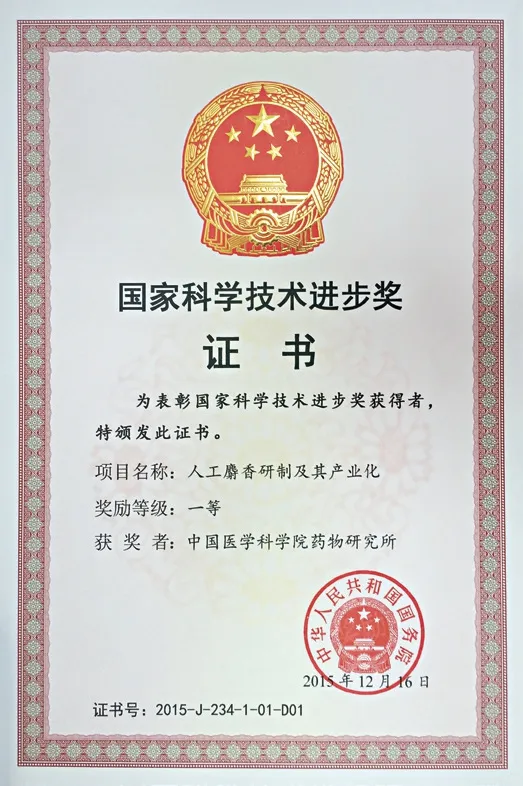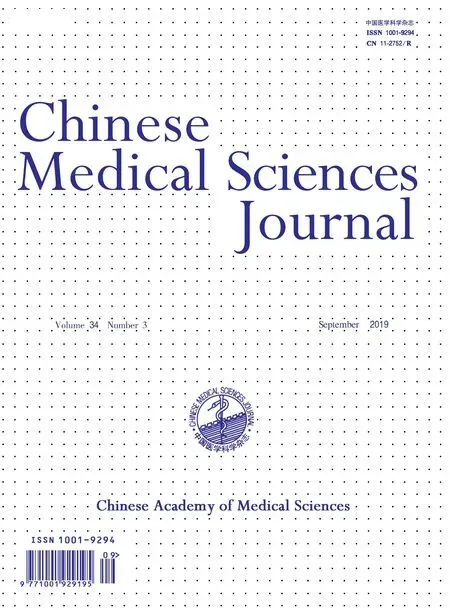Artificial Musk R&D and Manufacturing
MUSK, secreted by the preputial gland of the male musk deer, is a rare and valuable ingredient in traditional Chinese medicine (TCM). It can revive the Spirit and unblock closed disorders, invigorate blood and activate the channels, and eliminate swelling and relieve pain. Thus, it has been applied for the treatment of frequently-occurring diseases and complex diseases for more than 2000 years in Chinese history. Unfortunately,the musk deer has become one of the most endangered species in China due to extensive hunting and poaching. The Chinese government has protected the musk deer as a Category I key species since 2003. As a result, the source of musk is extremely scarce, and the fake and adulterated products are flooding the market, seriously affecting the quality of Chinese patent medicines and the safety of patients. In 1972, Academician Yu Dequan and his team began to carry our systematic research on artificial musk. The study was proved by the Ministry of Commerce of the People’s Republic of China, jointly commissioned by the Ministry of Health and China National Traditional Chinese Medicine Corporation, and funded by the National Science and Technology Commission’s “Sixth Five-Year Plan” program. Also, the Institute of Materia Medica of Chinese Academy of Medical Sciences offered technical guidance.
In 1993, the Ministry of Health approved artificial musk as a Class 1 TCM New Drug.

The research “Artificial Musk R&D and Manufacturing” has overcome a series of technical difficulties affecting manufacturing, defined key technical conditions and parameters, and established the core technology of manufacturing. Thus, largescale production of artificial musk became possible. The first batch of artificial musk was marketed in 1994; after over 20 years of efforts, most users have recognized that the artificial musk is equally effective as natural musk. The product has been used on a trial basis in about 1000 pharmaceutical companies,research institutions, and hospitals in 31 provinces, municipalities, and autonomous regions across China. Today, the annual number of users is about 400, and the artificial musk is used for the production of proprietary Chinese medicines as well as traditional Mongolian drugs, traditional Tibetan drugs, and traditional Uyghur drugs. The dosage forms include TCM forms (e.g. pills, powder, cream, and mini-pills)and modern forms (e.g. sprays and injections). Over 400 musk-based traditional Chinese patent medicines have been commercially available, many of which are national treasures such as Angong Niuhuang Pills (Tongrentang, Beijing), Shexiang Baoxin Pills (Shanghai Hutchison Pharmaceuticals, Shanghai),and Mayinglong Musk Hemorrhoids Ointment Cream (Mayinglong Pharm, Hubei). These first-aid drugs or specialty drugs reflect the inheritance and development of musk-based Chinese patent medicines and ethnic drugs. In 2015, the research “Artificial Musk R&D and Manufacturing” won the National Science and Technology Progress Award (first grade).
Artificial musk has received wide acclaim since it was put on the market. According to the research appraisal committee, “this innovative study filled the gaps at home and abroad and have achieved great economic, social, and ecological benefits. It is major scientific and technological breakthrough.”

As an active pharmaceutical ingredient (API) in Chinese patent medicines,artificial musk has benefited many pharmaceutical companies, ensuring the normal production of more than 400 traditional Chinese patent medicines. The unmet demand for musk since the founding of the People’s Republic of China has finally been satisfied with the manufacturing of artificial musk as it enables the adequate supply of the old products, wide application of new drugs, and ensured API supply for new drugs under R&D. It perfectly reflects the inheritance and development of the musk-based Chinese patent medicines and ethnic medicines and satisfies the clinical demands for TCM drugs.
A total of 140 tons of artificial musk was sold from 1994 to 2017, which translates to the musk sacs of at least 40 million musk deer. This technology has completely changed the traditional way of killing deer for musk and made great contribution to the conservation of musk deer and the sustainable development of ecological environment in China.
The economic benefit of the artificial musk is also very impressive. The cumulative sales of artificial musk has reached 8 billion yuan, with an income tax of up to 1.8 billion yuan. Each year, the value added to the relevant Chinese medicine enterprises in different areas exceeded 30 billion yuan, making tremendous contributions to the local profits and taxes.
 Chinese Medical Sciences Journal2019年3期
Chinese Medical Sciences Journal2019年3期
- Chinese Medical Sciences Journal的其它文章
- Research on the Antitumor Compounds from Cephalotaxus Hainanensis
- Management of an Adult with Goodpasture’s Syndrome Following Brain Trauma with Extracorporeal Membrane Oxygenation: A Case Report
- Transvaginal Reduction of a Heterotopic Cornual Pregnancy with Conservation of Intrauterine Pregnancy
- Research Progress on Diagnosis and Treatment of Chronic Osteomyelitis
- Association between GSTT1 Homozygous Deletion and Risk of Pancreatic Cancer: A Meta Analysis
- IL-36β Promotes Inflammatory Activity and Inhibits Differentiation of Keratinocytes In Vitro
